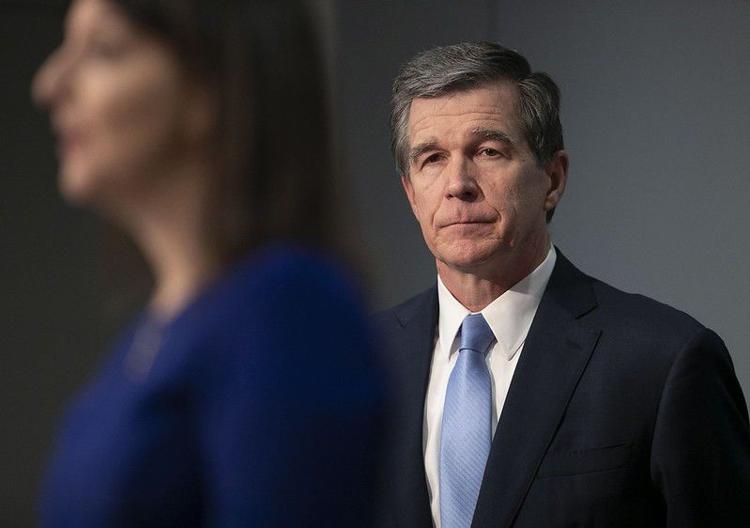Cooper rolls out plan for partial in-person learning for North Carolina schools

North Carolina Gov. Roy Cooper (right) listens to Dr. Mandy Cohen, secretary of the North Carolina Department of Health and Human Services, during a news briefing on COVID-19 on Thursday, April 30, 2020 at the Emergency Operations Center in Raleigh, N.C.
(The Center Square) – North Carolina schools will reopen with smaller in-person classes, but school districts can chose to resume with remote learning amid the COVID-19 outbreak, Gov. Roy Cooper announced Tuesday.
Under the governor’s plan, schools must maintain classroom sizes that would allow students to stay 6 feet away from each other, establish a process for isolation and limit gathering and nonessential visits.
“After working with health experts, school superintendents, teachers and more, we plan to put those protections in place and open our schools in a careful way,” Cooper said during a news conference Tuesday.
The plan calls for frequent hand washing, hand sanitizer in classrooms, symptom checks, an increase in disinfecting and cleaning and an end to food and beverage self-service.
K-12 students and teachers will be required to wear masks. The state plans to provide at least five reusable face coverings for the students and staff at nearly 3,000 schools.
Some schools received a two-month supply of thermometers, surgical masks, face shields and gowns in late June.
The North Carolina Department of Health and Human Services (NCDHHS) recommended in June that school districts expect schools to resume with either partial enrollment, full distant learning or full in-person classes depending on the severity of the COVID-19 outbreak in the state.
As of Tuesday, health officials still are advising schools to allow parents to opt into full online learning.
House Speaker Tim Moore, R-Cleveland, criticized Cooper on Tuesday for not fully reopening classrooms.
Moore said the decision “exacerbates the administration’s economic and public health failures while adding even more uncertainty for struggling families in North Carolina.”
“I urge the governor to present a workable, comprehensive plan for our schools, our economy, and vulnerable senior citizens, that recognizes the failures of his current scattershot approach and provides real opportunities for our state to move forward,” Moore said in a statement.
Cooper also extended the current phase of COVID-19 restrictions Tuesday, keeping certain businesses closed and limiting gatherings to 10 people indoors and 25 people outdoors.
Health officials said in June the decision to open schools would be based on the number of lab-confirmed cases of COVID-19, hospitalizations and emergency department visits, percentage of positive tests and the availability of tests and personal protective equipment.
There were 1,827 new COVID-19 cases reported to NCDHHS on Tuesday, raising the state’s total number of cases since March to 89,484, including 1,552 deaths.
There are 1,109 people currently hospitalized in North Carolina with COVID-19-like symptoms.
“We will continue to follow the science and data and update recommendations as needed,” said Dr. Mandy Cohen, NCDHHS secretary.
American Academy of Pediatrics (AAP) researchers last month said children and adolescents are less likely to be susceptible to severe complications from COVID-19 and are low-risk for contraction and death.
AAP, the American Federation of Teachers, the National Education Association, the American Association of School Administrators and the School Superintendents Association released a joint statement, calling for safe reopenings of schools based on science and the recommendations of health experts, teachers and parents.
The associations and others in the education field agree that “a one-size-fits-all approach” is not appropriate for learning.
President Donald Trump last week threatened to withhold federal funding from states that do not fully reopen schools. However, the group of health experts and educators said schools would require more funding to support safe reopenings.
“We call on Congress and the administration to provide the federal resources needed to ensure that inadequate funding does not stand in the way of safely educating and caring for children in our schools,” the statement said.

